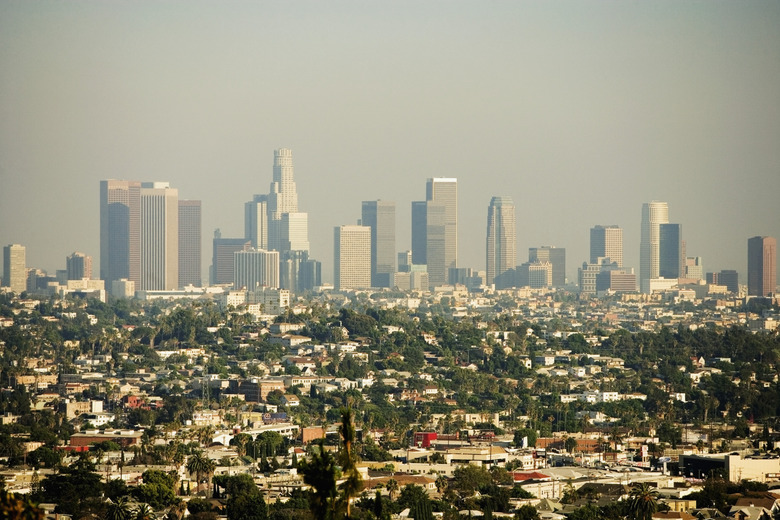Consequences Of Carbon Emissions For Humans
Carbon emissions contribute to climate change, which can have serious consequences for humans and their environment. According to the U.S. Environmental Protection Agency, carbon emissions, in the form of carbon dioxide, make up more than 80 percent of the greenhouse gases emitted in the United States. The burning of fossil fuels releases carbon dioxide and other greenhouse gases. These carbon emissions raise global temperatures by trapping solar energy in the atmosphere. This alters water supplies and weather patterns, changes the growing season for food crops and threatens coastal communities with increasing sea levels.
Shrinking Water Supplies
Shrinking Water Supplies
Carbon dioxide persists in the atmosphere for 50 to 200 years, so emissions released now will continue to warm the climate in the future. The EPA predicts that climate change will cause the demand for water to increase while the supply of water shrinks. Water is not only essential to human health but also to manufacturing processes and the production of energy and food. Climate change is expected to increase rainfall in some areas, thereby causing an increase in the sediment and pollutants washed into drinking water supplies. Rising sea levels will cause saltwater to infiltrate some freshwater systems, increasing the need for desalination and drinking water treatment.
Increasing Incidents of Severe Weather
Increasing Incidents of Severe Weather
Global warming has the potential to result in more wildfires, droughts and tropical storms, according to NASA. Catastrophic weather events caused $1 billion in damage in the United States during 2012. Storms like 2012's Hurricane Sandy and 2013's Typhoon Haiyan are becoming more frequent, and the devastation they cause takes local communities years to remedy, often with the help of international aid. The destruction of infrastructure causes several human health issues, including disease transmitted when water and sewer systems are not working properly. The storms themselves and the damage to infrastructure they cause often result in a tremendous loss of human life.
Changes in Food Supply
Changes in Food Supply
Changing weather affects the agricultural industry and the human food supply. Carbon emissions contribute to increasing temperatures and decreasing precipitation, changing the growing conditions for food crops in many areas. According to the U.S. Global Change Research Program, carbon emissions are causing warming in California's Central Valley that is projected to significantly reduce the yields of tomatoes, wheat, rice, maize and sunflowers in this region. Major changes in crop yield will cause food prices to rise around the world. In addition, climate change influenced by carbon emissions forces animals, many of which are hunted as food, to migrate to higher altitudes or northern habitats as the climate warms.
Geographical Changes
Geographical Changes
It takes only a small change in temperature to have enormous environmental effects; temperatures at the end of the last ice age were only cooler than today's temperatures by 2.5 to 5 degrees Celsius (5 to 9 degrees Fahrenheit), but parts of the United States were covered by thousands of feet of ice, according to NASA. The Intergovernmental Panel on Climate Change estimated that carbon emissions will cause global temperatures to rise by approximately 1.5 degrees Celsius (2.5 degrees Fahrenheit) over the next 100 years. This slight change can have dramatic effects on shorelines, especially those densely populated by humans where rising sea levels flood buildings and roads and influence shipping traffic. According to the EPA, sea levels on the mid-Atlantic and Gulf Coasts have risen over 20 centimeters (8 inches) in just 50 years after almost 2,000 years of no observable change.
References
- U.S. Environmental Protection Agency: Carbon Dioxide Emissions
- National Aeronautics and Space Administration: Global Climate Change Vital Signs of the Planet
- NOAA National Climatic Data Center: Billion-Dollar Weather/Climate Disasters
- U.S. Environmental Protection Agency: Climate Change Indicators in the United States
- NOAA National Climatic Data Center: Billion-Dollar Weather/Climate Disasters
- U.S. Global Change Research Program: Federal Advisory Committee Draft Climate Assessment: Agriculture
- U.S. Environmental Protection Agency: Climate Impacts on Water
Cite This Article
MLA
Cairoli, Sarah. "Consequences Of Carbon Emissions For Humans" sciencing.com, https://www.sciencing.com/consequences-of-carbon-emissions-for-humans-12730960/. 30 November 2013.
APA
Cairoli, Sarah. (2013, November 30). Consequences Of Carbon Emissions For Humans. sciencing.com. Retrieved from https://www.sciencing.com/consequences-of-carbon-emissions-for-humans-12730960/
Chicago
Cairoli, Sarah. Consequences Of Carbon Emissions For Humans last modified August 30, 2022. https://www.sciencing.com/consequences-of-carbon-emissions-for-humans-12730960/
